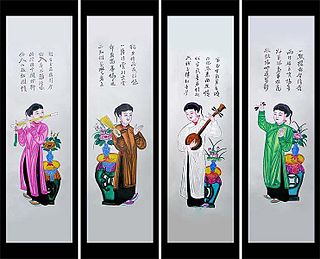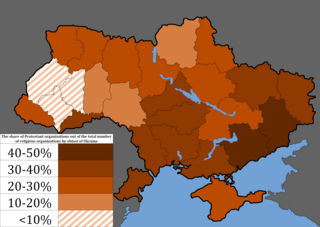Related Research Articles

Baptists form a major branch of Protestantism distinguished by baptizing professing Christian believers only, and doing so by complete immersion. Baptist churches also generally subscribe to the doctrines of soul competency, sola fide, sola scriptura and congregationalist church government. Baptists generally recognize two ordinances: baptism and communion.

Evangelicalism, also called evangelical Christianity or evangelical Protestantism, is a worldwide interdenominational movement within Protestant Christianity that affirms the centrality of being "born again", in which an individual experiences personal conversion; the authority of the Bible as God's revelation to humanity ; and spreading the Christian message. The word evangelical comes from the Greek (euangelion) word for "good news".

In Christianity, evangelism or witnessing is the act of preaching the gospel with the intention of sharing the message and teachings of Jesus Christ.

The mainline Protestant churches are a group of Protestant denominations in the United States and in some cases Protestant denominations in Canada largely of the theologically liberal or theologically progressive persuasion that contrast in history and practice with the largely theologically conservative Evangelical, Fundamentalist, Charismatic, Confessional, Confessing Movement, historically Black church, and Global South Protestant denominations and congregations. Some make a distinction between "mainline" and "oldline", with the former referring only to denominational ties and the latter referring to church lineage, prestige and influence. However, this distinction has largely been lost to history and the terms are now nearly synonymous.

P'ent'ay is an originally Amharic–Tigrinya language term for Pentecostal. Today, the term refers to all Evangelical Protestant denominations and organisations in Ethiopian and Eritrean societies. Alternative terms include Ethiopian–Eritrean Evangelicalism or the Ethiopian–Eritrean Evangelical Church. Sometimes the denominations and organizations are known as Wenigēlawī.

Protestantism is the third largest religious grouping in Bulgaria after Eastern Orthodoxy and Islam. In the census of 2011, a total of 64,476 people declared themselves to be Protestants of different denominations, up from 42,308 in the previous census in 2001 and from 21,878 in 1992. The marked rise in the number of Protestants in the last two decades is partly due to a boom in conversions among the Bulgarian Roma. In 2001, the two largest ethnic group among the Bulgarian Protestants were the Bulgarians and the Romani with some 25,000 members each.
The Mennonite Church in Vietnam is a Protestant denomination of Christianity in Vietnam. It has about 10,000 members. Substantial part of the Mennonite house church members are montagnards living in Central and Southern Highlands of Vietnam.
A Bible college, sometimes referred to as a Bible institute or theological institute, is an evangelical Christian or Restoration Movement Christian institution of higher education which prepares students for Christian ministry with theological education, Biblical studies and practical ministry training.

The majority of Vietnamese do not follow any organized religion, instead participating in one or more practices of folk religions, such as venerating ancestors, or praying to deities, especially during Tết and other festivals. Folk religions were founded on endemic cultural beliefs that were historically affected by Confucianism and Taoism from China, as well as by various strands of Buddhism. These three teachings or tam giáo were later joined by Christianity which has become a significant presence. Vietnam is also home of two indigenous religions: syncretic Caodaism and quasi-Buddhist Hoahaoism.
Protestants in India are a minority and a sub-section of Christians in India and also to a certain extent the Christians in Pakistan before the Partition of India, that adhere to some or all of the doctrines of Protestantism. Protestants in India are a small minority in a predominantly Hindu majority country, but form majorities in the north-eastern states of Meghalaya, Mizoram& Nagaland and significant minorities in Konkan division, Bengal, Kerala& Tamil Nadu, with various communities in east coast and northern states. Protestants today trace their heritage back to the Protestant reformation of the 16th century.

Christianity was first introduced to Vietnam in the 16th century. Catholics and Protestants today are reported to constitute 7% and 2% of the country's population respectively; however, the true number might be higher. Christian foreign missionaries are not allowed to proselytize or perform religious activities without government approval.
Nguyễn Hồng Quang is the Vietnamese pastor and lawyer, general secretary and vice-president of the Mennonite Church in Vietnam, chairman of the Legal Committee of the Vietnam Evangelical Fellowship.

Protestants in Thailand constitute about 0.77% of the population of Thailand. Protestant work among the Thai people was begun by Ann Judson in Burma, who evangelized Thai war captives who were relocated to Burma. Protestantism was introduced to the country of Thailand in 1828 through the work of Karl Gutzlaff and Jacob Tomlin, the first two resident Protestant missionaries in Thailand.

Protestants in Ukraine number about 600,000 to 700,000 (2007), about 2% of the total population. Nearly all traditional Protestant denominations are represented in the country. According to Christianity Today magazine, Ukraine has become not just the "Bible Belt" of Eastern Europe, but a "hub of evangelical church life, education, and missions". At present, the country is a key supplier of missionaries and a center of evangelical training and press printing for all the countries of the former Soviet Union, where the legal environment is not so favourable.

Protestants in Russia constitute 1–2% of the overall population of the country. Additionally there are around 15.000-20.000 Dukhobors and 40.000 Molokans in Russia, who have similarities to Protestantism. By 2004, there were 4,435 registered Protestant societies representing 21% of all registered religious organizations, which is second place after Eastern Orthodoxy. By contrast in 1992 the Protestants reportedly had 510 organizations in Russia.

Christianity in Russia is the most widely professed religion in the country. The largest tradition is the Russian Orthodox Church. According to official sources, there are 170 eparchies of the Russian Orthodox Church, 145 of which are grouped in metropolitanates. There are from 500,000 to one million Old Believers, who represents an older form of Russian Orthodox Christianity, and who separated from the Orthodox Church in the 17th century as a protest against Patriarch Nikon's church reforms.
Protestants in Japan constitute a religious minority of about 0.4% of total population or 509,668 people in number.

The Baptist Church in Ukraine is one of the oldest and most widespread Evangelical Christian denominations in the country. Before the fall of the Soviet Union, over half the 1.5 million acknowledged Baptists and Pentecostals in the USSR lived in Soviet Ukraine. Prior to its independence in 1991, Ukraine was home to the second largest Baptist community in the world, after the United States, and was called the "Bible Belt" of the Soviet Union.
While the Constitution of Vietnam officially provides for freedom of religion, in practice the government imposes a range of legislation restricting religious practice, such as registration requirements, control boards, and surveillance. All religious groups must seek approval and register with the government. The government requires all Buddhist monks to be approved by and work under the officially recognized Buddhist organization, the Vietnam Buddhist Sangha (VBS). The number of Buddhist student monks is controlled and limited by the Committee on Religious Affairs. According to a 2020 report by Human Rights Watch, prohibited religious activities are those deemed to be contrary to arbitrary notions of the "national interest", "public order", or "national unity". Unrecognized religious groups, including Cao Đài, Hòa Hảo, and some Christian, and Buddhist groups face "constant surveillance and harassment". Some religious groups may be subject to "public criticism, forced renunciation of faith, detention, interrogation, torture, and imprisonment." Laws continue to be applied unevenly however, with some local government areas taking a more relaxed and tolerant approach than others.
References
- ↑ US State Department 2006 country report on Vietnam
- ↑ Vietnam
- ↑ Sebastien Fath, "Des protestants au Vietnam?" Regardsprotestants.com , 1 June 2015 (in French)
- ↑ Protestantism in South Vietnam, US Navy, Bureau of Naval Personnel, Chaplains Division, 1967
- 1 2 Compass Direct (20 September 2002). "Vietnam Protestants Call Conference 'Miraculous'". Christianity Today. Retrieved 21 July 2006.
- ↑ FVA News
- ↑ History of the Vietnamese Bible, by Phuoc Nguyen, extracted from Linh Luc journal (January 1996), Vietnamese Baptist
- ↑ United Bible Societies, Asia Pacific - Laos & Vietnam
- 1 2 "Vietnam". US State Department. 7 September 2002. Retrieved 21 July 2006.
- ↑ "Minorities fleeing Vietnam to Cambodia". BBC. 4 May 2001. Retrieved 21 July 2006.
- ↑ Name Hidden (9 September 2002). "Vietnam's Hidden Tragedy". Christianity Today. Retrieved 21 July 2006.
- ↑ "Religious Freedom in Vietnam". Voice of America. 27 September 2004. Archived from the original on 28 November 2007. Retrieved 21 July 2006.
- ↑ Vietnam: Lawyers and internet writers Nguyễn Văn Đài and Le Thi Cong Nhan sentenced, The English Centre of International PEN, May 2007
- ↑ "Encourage the Wife of Imprisoned Vietnamese Lawyer". Persecution blog. 25 April 2007.
- 1 2 "Hanoi officially recognises Baptists and Mennonites", Asia News, October 2007.